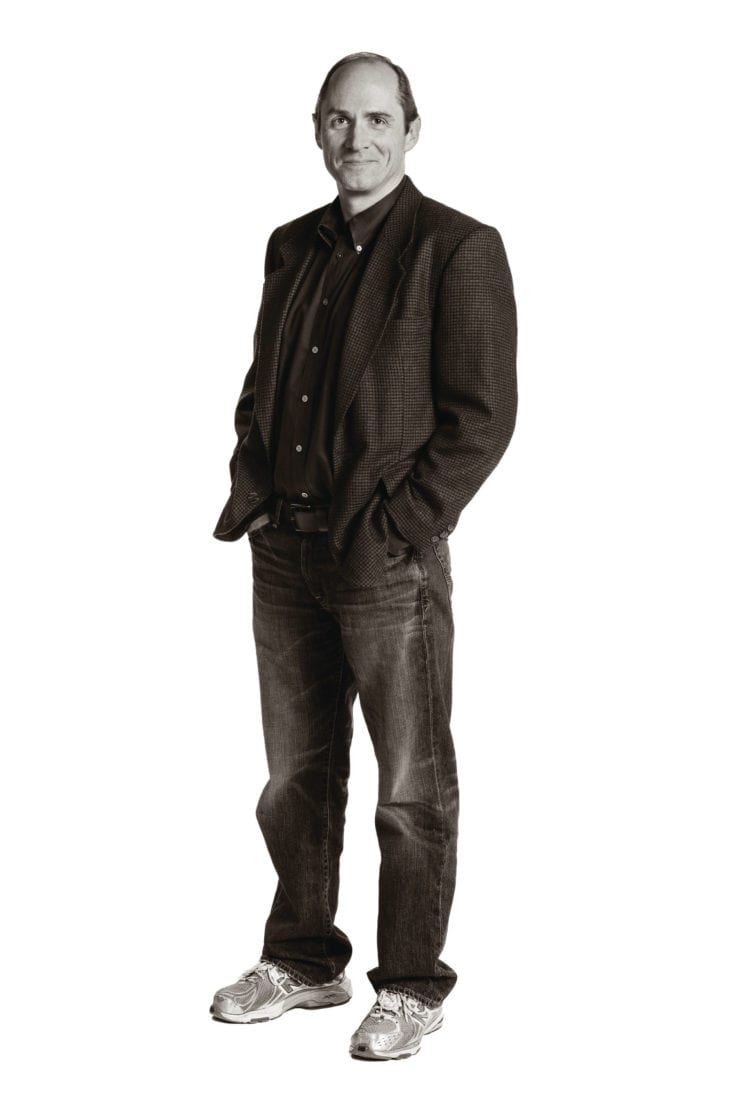Dean Rich Lyons on why the thought leadership of Berkeley Haas faculty is needed more than ever to redefine the rules of the road for business and society
At Berkeley Haas, we have long been “all in” when it comes to public policy—now more than ever. I don’t think we as a school have ever believed that the business of business schools is only business and that concerns about the broader public good are a distraction. In fact, the rapid pace of business and societal change is demanding that our faculty help find solutions to economic disruptions that appear in the headlines daily. And I am happy to report that our Berkeley Haas faculty are responding and making a positive difference.
For-profit enterprises have never existed in isolation from the rest of society. Businesses require a thriving economy, an educated and motivated workforce, and consumers who can afford to buy their products. None of these conditions occur by accident. They all depend on sound public policy—on the “rules of the road,” so to speak—in areas that include contract law, tax policy, employment law, securities regulation, real estate, public health, and energy. Berkeley is at the forefront in providing thought leadership in these and many other areas.
For many prominent issues, it is impossible to untangle the “business” from the “public policy.” As a result, business schools such as Berkeley Haas and its peers have a major role to play in supplying research and thought leadership to public-sector decision-makers. At least three forces are driving many business schools today to assume that role and dive deeper into public policy issues.
New technology
“Disruptive” technologies and radical new business models are creating new and urgent public policy challenges. Uber and Airbnb—the preeminent ride- and home-sharing platforms, respectively, as well as two of the world’s fastest-growing companies—have sparked fierce political and regulatory battles in cities around the world over rules for transportation and public accommodation. Google is lobbying U.S. state governments to allow driverless cars on the road. Google, Apple, Facebook, and other tech companies are embroiled in tense discussions with Congress and the national security establishment over surveillance and online privacy. All of these issues have significant implications for businesses and individual citizens.
Fallout from the financial crash of 2008
Experts may disagree about the precise policy failures that led to the crash, but it’s clear that both the financial industry and government regulators lost their moorings to core principles and values. These failures didn’t just cause the collapse of the economy, as bad as that was. They also caused a collapse of trust and confidence in business and—let’s be honest— business schools. For many years, critics have accused business schools of fostering arrogance and prizing profits over principles. At Berkeley Haas, we aim to fulfill two primary responsibilities. The first is to provide research that helps explain exactly what happened and how we can minimize exposure to a similar catastrophe in the future. The second is to instill in future business leaders a broader sense of values and responsibilities that goes beyond increasing the next quarter’s profits.
The new science of leadership
It turns out that public officials from around the world are flocking to Berkeley Haas and other business schools for executive seminars, policy research, and coaching. Why? Because those officials are grappling with problems at the intersection of politics and business: how to combat corruption, how to pass laws and regulations that promote investor confidence, how to balance economic growth with poverty reduction and environmental stability. Politicians have big questions about what business needs, and business leaders depend heavily on getting the answers right.
Illuminating the Issues
At Berkeley Haas, our relationship with government works because we start with research and have become an invaluable resource on important issues. Our faculty translate this research into accessible language and let it be known they are ready to offer their expertise when needed.
One example is the Energy Institute at Haas. Severin Borenstein, the E.T. Grether Chair in Business Administration and Public Policy at the Haas School, led the institute from its inception in 1994 to 2014, focusing on the rigorous economic analysis of energy policy. Researchers at the institute have analyzed California’s ill-fated electricity-trading market, which in 2000 led to soaring spot-market prices and rolling blackouts. They’ve tackled issues such as efficient cap-and-trade policies for reducing greenhouse emissions, subsidies for renewable energy, and the economics of fuel efficiency.
Such projects lay the groundwork for Haas to be viewed by state policymakers as a resource. Borenstein and other institute faculty members have advised the state on numerous issues over the years. In 2014, an advisor to California Governor Jerry Brown reached out to Borenstein for guidance on an aspect of the state’s complex cap-and-trade system. Borenstein pointed him to posts on the institute’s blog, which translate research on real-world policies into language that’s accessible to stakeholders such as legislators, regulators, environmental organizations, and journalists.
For many prominent issues, it is impossible to untangle the “business” from the “public policy.”
Establishing this reputation as a resource on a hot public policy topic also furthered our national and even global reputation. News organizations such as The New York Times, The Wall Street Journal, The Economist and National Public Radio seek out the institute’s faculty for interviews. In December 2014, for example, NBC News reported on an article by several institute researchers, published in Science magazine, that assessed President Barack Obama’s clean- energy plan. In April 2015, an institute study by Haas professors Paul Gertler and Lucas Davis that predicted an explosive growth in carbon emissions tied to the rising use of air conditioners in developing nations made headlines around the world, from The Washington Post to The Times of India.
Some areas of public policy are natural fits for Berkeley Haas. For example, researchers at our Fisher Center for Real Estate and Urban Economics, including Co-Chair Nancy Wallace, are working with the Federal Reserve Board and the Treasury Department to better understand the warning signs that led to the mortgage and financial crisis of 2008. In another case, Haas finance professor Terry Hendershott became an important participant in a major government investigation. Public policy offers Haas a unique opportunity to highlight our strengths—and our faculty—on the global stage. And we have a big impact, especially on issues that are heavily subject to government regulation.
At the same time, many of the greatest social and global challenges of our day cannot be changed by one individual or even one institution. Solutions require working across sectors and institutions to have a chance at success. Our Center for Social Sector Leadership is training MBA students to become such multi-sector leaders with the skills to move effectively between the worlds of corporate leaders, public decision-makers, and nonprofit and social enterprise boards. In the world of research, our Energy Institute launched a collaboration, called E2e, with the University of Chicago and MIT, with funding from the Alfred P. Sloan Foundation, that seeks to measure and enhance the impact of energy-efficiency initiatives.

“Having studied real estate price dynamics for more than two decades, Professor Nancy Wallace warned of the real estate bubble long before it popped. In the aftermath of the financial crisis, she has been a key figure in monitoring economic risk for the Federal Reserve and U.S. Treasury. Recently, Wallace, the Lisle and Roslyn Payne Professor of Real Estate and Capital Markets, was named chair of the Fed’s Model Validation Council to develop better models for stress-testing financial institutions. At Treasury, Wallace is serving on the Financial Research Advisory Council to develop new strategies for measuring aggregate risk in the mortgage market. She’s also part of the Liquidity Working Group to identify markets where new products and new organizational structures could induce liquidity threats. She and her Haas colleagues at the Fisher Center’s new Real Estate and Financial Markets Laboratory are compiling and analyzing huge datasets on mortgages, employment, and house prices over the past 15 years to create new network-based risk metrics for the mortgage market and a more effective housing-price index that can provide better warning of future bubbles.”

“In 2014, the U.S. Commodity Futures Trading Commission (CFTC) had a tip from a whistleblower that a trader named Navinder Singh Sarao might have been responsible for the stock market “flash crash” that roiled stock markets on May 6, 2010. To find out if that was true, the CFTC retained Haas Finance Professor Terry Hendershott, whose research focuses on high-frequency trading, to analyze Sarao’s trading. Hendershott, who holds the Cheryl and Christian Valentine Chair, found that the trader had been placing huge buy and sell orders, up to US$200 million, only to cancel them as they got close to being executed. Hendershott showed that Sarao’s orders made no business sense and had the effect of spoofing the markets—in essence creating order imbalances that preceded the flash market crash. In April 2015, the CFTC announced that British authorities had arrested Sarao, at the request of the U.S. Department of Justice, for unlawful manipulation of the stock market.”
Sectors Beyond Business
While energy policy and financial regulation seem to fall naturally within the expertise of business schools, there are other important and highly relevant areas of public policy that, at first glance, might not seem to fit as neatly.
Consider the work of Professor Ernesto Dal Bó (see below), co-director of the Berkeley Center for Economics and Politics, who studies the economic and political interactions that affect governance, corruption, economic development, and social conflict. He and his colleagues at the center have studied, for example, how violence and bad pay hurt the quality of politicians and the most accurate ways to measure religious and ideological fervor.
These topics may seem far afield from a business curriculum, but they are crucial to those who care about global economic prosperity. Just ask any CEO who is trying to do business in a nation that ranks high on Transparency International’s list of corruption. Ask any senior public official who is struggling to tame corruption. These are complex social and political challenges with profound implications for business and society.
Public policy offers Haas a unique opportunity to highlight our strengths—and our faculty—on the global stage.
It isn’t just corporate executives who seek out business schools for expertise on public policy. Public officials worldwide look to Haas for executive training. A few years ago, a number of Haas board members and alumni recognized that Chinese officials were hungry for insights from Silicon Valley on business innovation and leadership. As a result, we formed a partnership with the China Executive Leadership Academy Pudong (CELAP), one of China’s academies for grooming fast-rising officials in the Chinese Communist Party. With CELAP, we now provide a much-prized executive program in Shanghai. We run similar programs for senior government officials from Uruguay, Poland, and other nations.

“Identifying strategies for strengthening the integrity and effectiveness of public institutions is a common goal in Professor Ernesto Dal Bó’s work, which sheds light on how economic forces shape and are shaped by the health of political and social institutions. Dal Bó, the Phillips Girgich Professor of Business in the Business and Public Policy Group, has studied a host of issues, including corruption and coercion in government, political dynasties in the U.S. Congress, the potential for sudden increases in wealth to fuel social conflict, and the impact of moral beliefs and self-esteem on the integrity of civil servants. His research increasingly attracts the interest and active collaboration of governments around the world. Since July 2014, for example, Dal Bó and Associate Prof. Frederico Finan have led a workshop on reducing corruption for top public officials from India. With the Mexican government, Dal Bó examined whether higher wages attract better public servants (they do).”
How To Foster Public Policy?
As a teacher of leadership, I strongly believe that shared values are central to defining a broader set of priorities. As an economist, however, I also believe in the importance of incentives. Accordingly, I believe it’s important that Berkeley Haas develop a culture of engagement in the public good and support initiatives related to public policy, such as corporate responsibility and social-sector leadership.
At Berkeley Haas, our Defining Leadership Principles—Question the Status Quo, Confidence Without Attitude, Students Always, and Beyond Yourself—remind our faculty that public service is a priority, not just window dressing. When they see the work of many of their colleagues, they also know that initiatives in public policy can enhance their own career prospects. Our culture and our capabilities reinforce each other.
In the real world, of course, people are motivated by concrete incentives. One of the best incentives Haas can offer its faculty is flexibility, in both their schedules and their workloads. There’s a reason why most academics serve only two years on the White House Council of Economic Advisers: most professors lose tenure after an absence of more than two years. But I believe that faculty wanting to take more active roles in government must be granted greater leeway. For example, several of our professors—ranging from Janet Yellen, who is now chairman of the Federal Reserve Board, to Michael Katz, who served as chief economist for the Federal Communications Commission—were allowed either to reduce their workloads or even take several years off so that they could work in the public sector.
The Complexity of Business
Having faculty members who take on high-profile public posts can create perceptions that the school is tied to a particular school of thought. For example, not everybody agrees that the Federal Reserve should have kept short-term interest rates at almost zero for so long after the financial crisis. The fact that Janet Yellen spent much of her career at Haas has linked that policy to the school more than one might expect.
By incorporating public policy into Haas’ research and curriculum, we engage in the full complexity of training leaders, rather than simply managers.
The choice to engage in public policy has tilted our faculty toward the field of economics. That has been a strength for us, but it has also come at an opportunity cost: other things being equal, more economists means fewer psychologists, sociologists, or experts from other disciplines. As a business school, we have to be mindful about making sure our public policy teaching opportunities continue to mesh with the needs and demands of our students.
The connection between business schools and policymakers will likely get tighter over time. At Haas, we make it our goal to build on this reality and to encourage our faculty to navigate smoothly across the public, civic, and private sectors. This goes for our graduates, too, who benefit from these multi-sector capabilities. By incorporating public policy into our research and curriculum, we engage in the full complexity of training leaders, rather than simply managers.
Author note: Rich Lyons, BS 82, has been the dean of Berkeley Haas since 2008. A slightly different version of this article was originally published in the November/ December 2015 issue of BizEd magazine, the leading source for information, ideas, and insights related to international management education.
